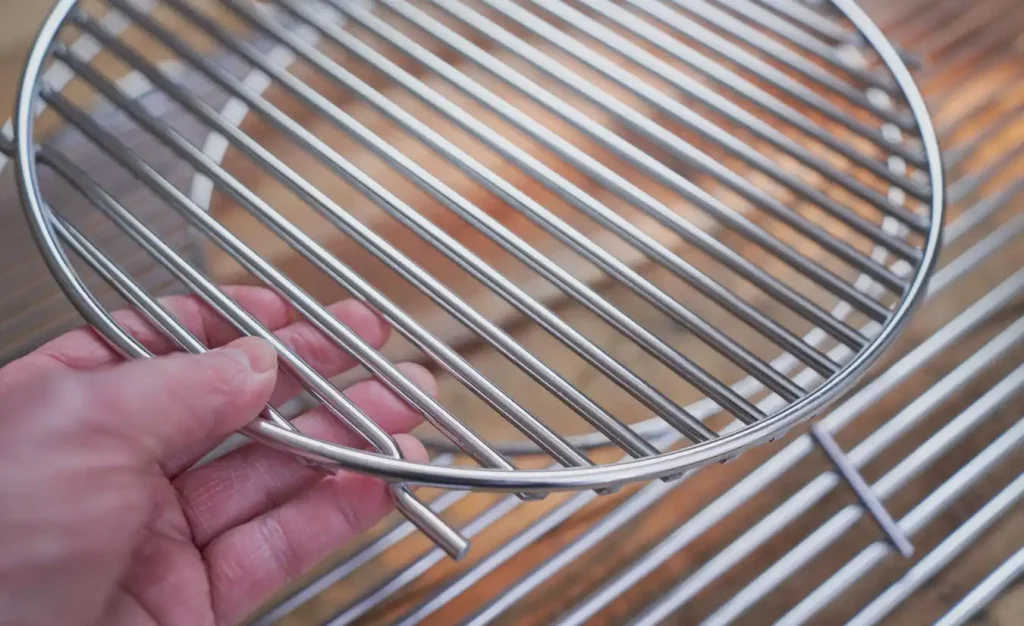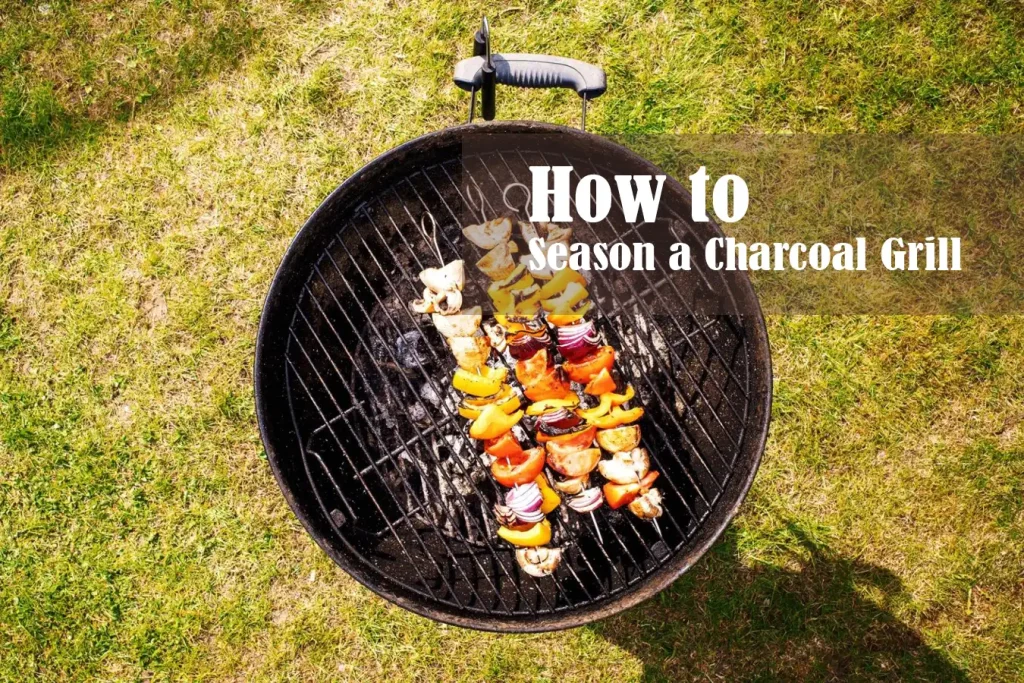Unraveling the mystery of how to season a charcoal grill is a true art form for any BBQ enthusiast.
As a passionate blogger and outdoor lover, and I'm here to help you master this essential skill.
The purpose of this article is not only to guide you through the seasoning process but also to enrich your BBQ experience.
Let's awaken your inner grill master and make every outdoor cooking adventure a delight.
Prepare yourself for a journey that promises to enhance your grill's performance and longevity, while improving the flavor of your food.
You're just a few steps away from learning the secret sauce of successful grilling, so let's dive in!
The Importance of Seasoning Your Charcoal Grill
Seasoning isn't just a term reserved for the culinary world. It's also a crucial step in maintaining the longevity and performance of your charcoal grill. But what exactly does it entail, and why is it so important? Let's break it down.
How Seasoning Protects Your Grill
Seasoning a grill, much like seasoning a cast-iron skillet, involves coating it with a layer of oil and heating it to create a non-stick, rust-resistant surface. This process, also known as curing, forms a protective barrier that shields the metal from moisture and prevents rusting. It's like giving your grill its very own suit of armor.
But the benefits don't stop there. Seasoning also helps in cleaning up after your grilling session. The non-stick surface ensures that food particles and excess grease don't cling to the grates, making the cleanup process a breeze.
The Impact of Seasoning on Food Flavor
Now, let's talk about flavor – the heart and soul of any barbecue. Seasoning your grill doesn't just protect it; it also enhances the taste of your food. How, you ask? Well, each time you grill, the oil used for seasoning gets heated and reabsorbed into the grates, creating a rich, smoky flavor that gets transferred to your food. It's like your grill remembers all your past barbecues and infuses those flavors into your new dishes.
Preparing Your Charcoal Grill for Seasoning
Before we dive into the seasoning process, it's crucial to prepare your grill. This involves a thorough cleaning to remove any old grease, food particles, or rust that could interfere with the seasoning. Let's walk through this process together.
Cleaning the Grill: A Step-by-Step Guide
- Remove the grates and other removable parts: Start by disassembling your grill. Take out the grates, ash catcher, and any other parts that can be removed. This will make the cleaning process easier and more thorough.
- Scrub away the grime: Using a grill brush or a ball of aluminum foil, scrub the grates to remove any stuck-on food particles or rust. Be sure to scrub both sides of the grates.
- Wash with soapy water: Next, fill a bucket with warm water and a mild dish soap. Dip a sponge or cloth into the soapy water and thoroughly clean the grates and other parts. This will help remove any remaining grease or grime.
- Rinse and dry: Rinse off the soap with warm water and dry all parts thoroughly. It's essential to ensure no moisture is left as it could lead to rusting.
Ensuring Your Grill is Dry and Ready for Seasoning
After cleaning, give your grill ample time to dry. You can leave the parts out in the sun or wipe them down with a dry cloth. Remember, any remaining moisture can interfere with the seasoning process and lead to rusting. So, patience is key here!
Choosing the Right Oil for Seasoning
Now that your grill is clean and dry, it's time to choose the right oil for seasoning. The type of oil you use can impact the effectiveness of the seasoning and the flavor it imparts to your food.
Different Types of Oils You Can Use
There are several types of oils you can use for seasoning, including vegetable oil, canola oil, flaxseed oil, and even lard or shortening. Each of these oils has a different smoke point – the temperature at which the oil starts to smoke and break down. For seasoning a grill, it's best to choose an oil with a high smoke point.
Pros and Cons of Each Type of Oil
- Vegetable and Canola Oil: These are the most commonly used oils for seasoning due to their high smoke points and neutral flavors. They're also readily available and relatively inexpensive.
- Flaxseed Oil: This oil is often used for seasoning cast iron cookware due to its ability to create a hard, slick surface. However, it's more expensive and has a lower smoke point than vegetable or canola oil.
- Lard or Shortening: These can create a good seasoning layer and impart a unique flavor to your food. However, they can be messy to work with and may not be suitable for those following a vegetarian or vegan diet.
In the next section, we'll go through the actual process of seasoning your grill.
How to Season a Charcoal Grill: Step-by-Step
Now that we've prepared our grill and chosen our oil, it's time to get down to the business of seasoning. This process is straightforward and requires just a few steps. Let's get started.
Step 1: Applying the Oil
Start by applying a thin layer of your chosen oil to the grates and other parts of the grill. You can use a cloth or a paper towel to do this. Be sure to coat all surfaces, including the underside of the grates. Remember, we're not deep frying here, so a little oil goes a long way!
Step 2: Heating the Grill
Next, it's time to heat your grill. If you're using a charcoal grill, light your coals and let them burn down until they're covered with white ash. Then, spread them out and put your oiled grates in place. Close the lid and let the grill heat up for about 30 minutes to an hour. This process allows the oil to bake onto the grates, creating a protective and non-stick layer.
Step 3: Cooling and Repeating the Process
After the grill has heated for the appropriate amount of time, turn off the heat and let it cool completely. Once it's cool, you can repeat the process. Applying several layers of oil and heat will create a stronger seasoning that lasts longer.

In short, to season a charcoal grill, coat the grates evenly with a high heat-resistant cooking oil, heat the grill to a high temperature for about 15-20 minutes, then let it cool completely to create a protective layer that prevents rust and makes it non-stick.
Learn more: How to Season a New Charcoal Grill
Maintaining Your Seasoned Charcoal Grill
Seasoning your grill is not a one-time task. To keep your grill in top shape, you'll need to maintain the seasoning and reapply it as needed.
How Often You Need to Season Your Grill
The frequency of seasoning depends on how often you use your grill and the types of food you cook. If you're a frequent griller, you might need to season your grill every few weeks. If you grill less often, a couple of times per season might be enough. Also, if you cook a lot of acidic foods like tomatoes or marinades with vinegar, you might need to season more often as these can break down the seasoning.
Cleaning Tips to Maintain the Seasoning
Maintaining your grill's seasoning also involves proper cleaning. After each use, let the grill cool down, then use a grill brush to remove any food particles. Avoid using harsh chemicals or abrasive tools that can strip away the seasoning. If the grates become too dirty, you can wash them with warm soapy water, rinse thoroughly, and then re-season.
Remember, a well-maintained grill not only lasts longer but also enhances the flavor of your food.
Related: excess oil, gas grills, wire brush, spray bottle, electric charcoal starter, cast iron grates, high smoke point oil, peanut oil, dust and metal shavings, wire grill brush, gas grill, new grill, cooking grate, manufacturing process, olive oil, grill fired, grill pit, clean up a snap, food taste, brand new grill, hot coals, light coating, prevent rust, onion dipped, coal dust, non stick surfaces, whole grill, air dry completely, manufacturing oils, residual paint, wet cloth, factory chemicals, turn dark bronze, completely cool, firmly brush, significant build up, rust forming, about two hours, season a new grill, recommend seasoning, better flavor, clean cloth, even coating, prevent rusting, first cook.
FAQs about Season a Charcoal Grill
What is the best oil to season a charcoal grill with?
Oils with a high smoke point, such as canola oil, vegetable oil, or grapeseed oil, are the best choices for seasoning a charcoal grill.
What is the best way to season a grill?
The best way to season a grill involves cleaning the grill, applying a thin layer of oil, and heating the grill to allow the oil to bake onto the grates. This process should be repeated several times for a strong, durable seasoning.
How do you season a grill for the first time?
To season a grill for the first time, clean the grates thoroughly, then coat them in a high smoke point oil, heat the grill to high heat, and let it sit for about 30 minutes to an hour.
Do I have to season a charcoal grill?
Yes, seasoning a charcoal grill is crucial as it helps create a non-stick surface and extends the life of your grill by preventing rusting.
How often should you season a charcoal grill?
You should season your charcoal grill at the beginning of the grilling season and then once every few months depending on how often you use it.
Conclusion
Seasoning your charcoal grill is an essential step in ensuring its longevity and enhancing the flavor of your food. It's a simple process that involves cleaning your grill, applying a thin layer of oil, and heating the grill to allow the oil to bake onto the grates.
However, it's important to avoid common mistakes such as using too much oil, not cleaning the grill before seasoning, and using harsh cleaning methods. By following the tips and steps outlined in this article, you'll be well on your way to a well-seasoned grill and delicious, flavorful barbecues.
So, what's next? It's time to put your knowledge into practice. Grab your grill, choose your oil, and start the seasoning process. Remember, a well-seasoned grill is the secret to a successful barbecue. Happy grilling!
Read next: How to Smoke a Ham on a Charcoal Grill


